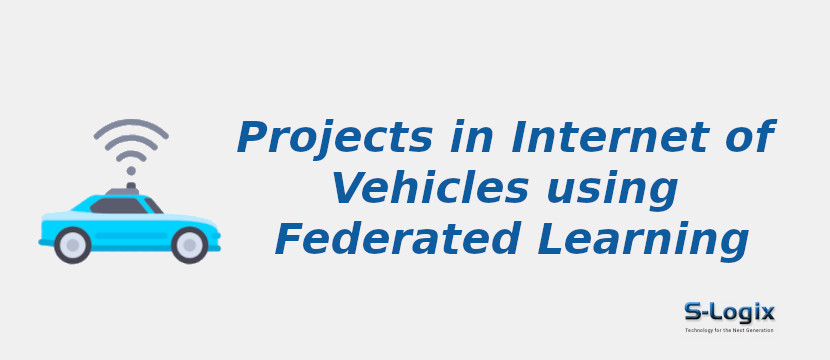Project Background: The context of the Internet of Vehicles (IoV) using federated Learning revolves around addressing the challenges associated with traditional centralized machine learning models in vehicular networks. In conventional approaches, vehicle data is typically collected and processed in a centralized server, posing security and privacy concerns as sensitive information is transmitted and stored. Federated Learning offers a decentralized alternative, enabling model training to occur locally on individual vehicles without exchanging raw data. This approach not only preserves user privacy but also reduces the communication burden on the network. The IoV context emphasizes the need for efficient and real-time decision-making to enhance vehicular safety, traffic management, and the entire performance of the system. By leveraging federated Learning in IoV, this project aims to develop a privacy-preserving framework that allows vehicles to learn from each other while respecting data ownership and security, contributing to advancing intelligent and secure vehicular networks.
Problem Statement
- The IoV in conventional systems, where data from vehicles is aggregated and processed in a centralized server, reduces privacy, security, and communication overhead.
- The exchange of raw, sensitive data between vehicles and a central server poses risks and may lead to potential privacy breaches.
- Additionally, the dependency on a centralized infrastructure can result in latency issues and increased vulnerability to cyber-attacks.
- It mainly addresses these issues by proposing a federated learning framework for IoV, where model training occurs locally on individual vehicles.
- This decentralized approach ensures that sensitive information remains on the device, preserving user privacy and reducing the need for extensive data transmission to a central server.
- The challenge lies in designing an effective and efficient system tailored to the unique characteristics of vehicular networks, considering factors such as dynamic topology, varying data distributions, and real-time decision-making requirements.
Aim and Objectives
- The project aims to enhance the efficiency, privacy, and security of IoV by implementing Federated Learning.
- Develop a decentralized, federated learning framework that is tailored for IoV.
-
Ensure privacy preservation by allowing model training on individual vehicles without transmitting raw data to a central server.
-
Address the challenges of dynamic topology and varying data distributions in vehicular networks.
-
Improve real-time decision-making capabilities for enhanced vehicular safety and traffic management.
-
Evaluate the performance of the Federated Learning model in IoV scenarios considering factors such as latency, accuracy, and communication overhead.
Contributions to the Internet of Vehicles using Federated Learning
- Enables model training on individual vehicles without sharing raw data centrally. It preserves user privacy, addressing concerns about collecting and transmitting sensitive information.
- By distributing the learning process across vehicles, the system becomes more robust to changes in network topology. It improves scalability, enhancing the overall reliability and efficiency of the IoV system.
- Minimizing the need for continuous data exchange with a central server reduces communication overhead, alleviating congestion in vehicular networks and enhancing real-time decision-making capabilities.
- Vehicular networks are dynamic, with changing connectivity and data distributions, and adapt well to these dynamic environments, ensuring that models remain relevant and effective even as the network topology evolves.
- It optimizes resource utilization by leveraging individual vehicles computational power, leading to more efficient use of computing resources within the IoV and making the system more cost-effective and sustainable.
-
Adopting IoV facilitates real-time model updates and decision-making, which is crucial for collision avoidance and traffic management applications, where timely and accurate responses are imperative.
Deep Learning Algorithms for Internet of Vehicles using Federated Learning
- Deep Neural Networks (DNN)
-
Convolutional Neural Networks (CNN)
-
Recurrent Neural Networks (RNN)
-
Long Short-Term Memory (LSTM)
-
Autoencoders
-
Generative Adversarial Networks (GAN)
-
Federated Neural Networks
-
Capsule Networks
-
Attention Mechanisms
-
Transfer Learning Models
Datasets for Internet of Vehicles using Federated Learning
- NXP Car Data
Udacity Self-Driving Car Dataset
-
ApolloScape Dataset
-
NuScenes Dataset
-
Audi Autonomous Driving Dataset
-
Comma.ai Dataset
-
Cityscapes Dataset
-
Waymo Open Dataset
-
Baidu ApolloScape Dataset
-
KITTI Vision Benchmark Suite
Performance Metrics for Internet of Vehicles using Federated Learning
- Model Accuracy
-
Privacy Preservation Metrics
-
Communication Overhead
-
Convergence Speed
-
Resource Utilization
-
Security Metrics
-
Decentralization Metrics
-
Distribution of Model Updates
-
Real-Time Decision-Making Metrics
-
Federated Learning Overhead
-
Scalability Metrics
Software Tools and Technologies
Operating System: Ubuntu 18.04 LTS 64bit / Windows 10
Development Tools: Anaconda3, Spyder 5.0, Jupyter Notebook
Language Version: Python 3.9
Python Libraries:
1. Python ML Libraries:
- Scikit-Learn
- Numpy
- Pandas
- Matplotlib
- Seaborn
- Docker
- MLflow
2. Deep Learning Frameworks:
- Keras
- TensorFlow
- PyTorch
